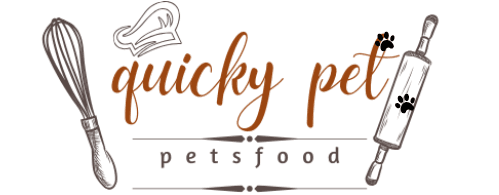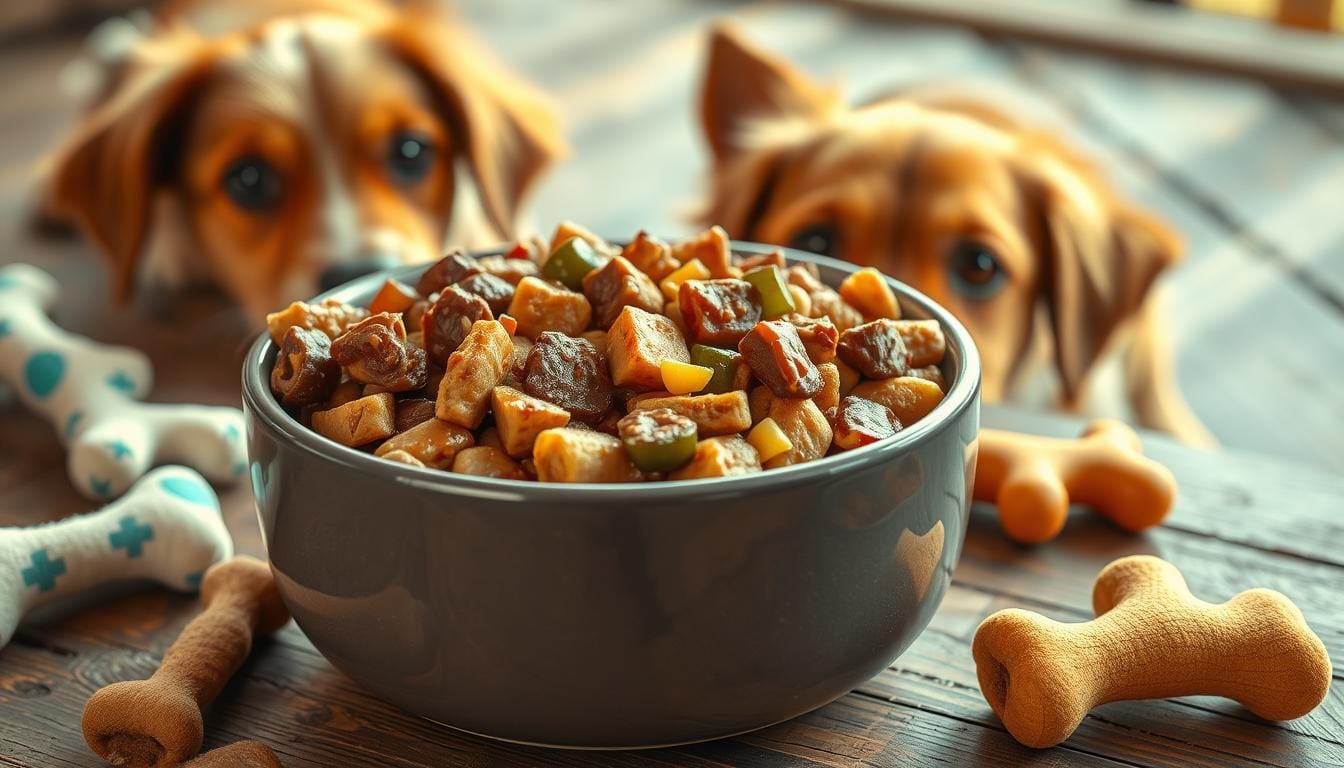Best Wet Dog Food: Complete Nutrition Guide for Dogs
Did you know 90% of vets prefer wet dog food over dry kibble? This shows how good wet dog food is for your dog. It tastes better and keeps them hydrated, making it a great choice for pet owners.
In this guide, we’ll explore wet dog food in depth. We’ll look at the important nutrients, types, and how to choose the best for your dog. Whether you need to meet specific dietary needs or just want a tasty, healthy meal for your dog, we’ve got you covered.
Table of Contents
Key Takeaways
- Wet dog food is recommended by 90% of veterinary experts for its benefits
- Wet food offers enhanced palatability, higher moisture content, and easier consumption for senior dogs
- Quality wet dog food provides a complete and balanced diet with essential nutrients like protein, fats, carbohydrates, vitamins, and minerals
- Understanding AAFCO standards and nutritional requirements is crucial when choosing the right wet dog food
- Factors like life stage, breed, and health concerns should guide your selection of wet dog food
Understanding Wet Dog Food Benefits
Wet dog food has many benefits that make it a great choice for pet owners. It has more moisture than dry kibble, which helps with digestion and keeps your dog hydrated. Wet food has over 11% moisture, unlike dry kibble which has less than 11%.
Wet dog food also tastes better, making it perfect for picky eaters. Its soft, tasty textures and flavors can make even the most finicky pups excited to eat. This is great for senior dogs or those with dental problems, as it’s easier to chew and swallow.
Digestibility and Nutrition
Wet dog food is easier for dogs to digest than dry kibble. This means your dog can absorb more of the important nutrients it needs. It’s especially good for dogs with sensitive stomachs or those needing a gentler diet. Many top-quality wet foods meet AAFCO nutritional standards, offering a complete and balanced meal.
Palatability for Picky Eaters
If your dog is picky, wet dog food can be a big help. Its soft, flavorful textures and smells can make even the most finicky pups eager to eat. This makes mealtime more fun for both you and your dog.
Ease of Consumption for Seniors
As dogs get older, they may have trouble chewing or dental issues. Wet dog food’s soft, smooth texture makes it easier for senior dogs to eat. This ensures they get the nutrients they need without struggling, which is especially helpful for older dogs or those with dental problems.
Essential Nutrients in Quality Wet Dog Food
Quality wet dog food is packed with essential nutrients. These nutrients include proteins, fats, carbohydrates, vitamins, and minerals. They are vital for your dog’s health and happiness.
Protein is key in wet dog food. It helps keep muscles strong and growing. Good wet food has more than 18% protein for adult dogs and 22% for puppies. It’s important that this protein is easy for your dog to digest.
Fats in wet dog food give energy and help with vitamin absorption. They should make up 12-18% of the food. Omega-3 and omega-6 fatty acids are good for your dog’s skin and coat.
Carbohydrates in wet dog food add energy and help with digestion. Even though wet food has less carbs than dry food, they should be high-quality and easy to digest.
Vitamins and minerals are also key. They boost the immune system, support bones, and help with body functions. Quality wet food includes vitamins A, B-complex, C, D, and E, and minerals like calcium, phosphorus, and zinc.
The water in wet dog food helps with digestion and nutrient use. It’s great for dogs who don’t drink enough or have trouble staying hydrated.
Knowing about the nutrients in quality wet dog food helps you choose the best diet for your dog. This ensures they stay healthy and happy.
Types of Wet Dog Food Available
Pet owners have many choices in wet dog food. There are smooth pate-style, chunky stews, and gravies. Each type meets different needs and tastes of dogs. Find the best fit for your furry friend.
Pate Style Formulas
Pate-style wet dog food is smooth and creamy. Dogs love it because it’s soft and easy to eat. It’s made with finely ground meat and a tasty sauce.
Chunky Stews and Gravies
Chunky stews and gravies are great for dogs who like a hearty meal. They have big chunks of meat and veggies in a flavorful sauce. Dogs and owners both like the texture and taste.
Loaf-Style Products
Loaf-style wet dog food is firmer and sliceable. It’s made with quality proteins and can be mixed with kibble. It’s good for dogs who like a meatier texture.
Wet dog food adds moisture and flavor to your dog’s diet. It comes in many styles and flavors. Try different ones to see what your dog likes best.
| Brand | Product | Size | Price | Nutritional Highlights |
|---|---|---|---|---|
| Hill’s Science Diet | Wet Dog Food | 3.5 oz, 5.8 oz, 13 oz | $34.32 – $69.60 | Chicken, beef, barley, vegetables, rice, salmon |
| Pedigree | Chopped Ground Dinner | 13.2 oz | $20.41 | Budget-friendly wet dog food |
| Hill’s Prescription Diet | Metabolic | 12.8 oz | $56.99 | Specialized formula for weight management |
| Blue Buffalo Basics | Skin & Stomach Care | 12.5 oz | $39.67 | Targeted nutrition for senior dogs |
| Royal Canin | Large Puppy | 13 oz | – | Tailored for large-breed puppies |
| Purina Pro Plan | Development Puppy | 13 oz | – | Salmon-based formula for small-breed puppies |
| Rachael Ray Nutrish | Wet Dog Food for Adult Small Breeds | 2.8 oz | – | Higher protein and nutrients for small dogs |
| Purina | Wet Dog Food | Various | Varies | High-protein, vet-recommended options |
| Cesar | Soft Wet Dog Food Filets in Gravy | 3.5 oz | – | Real meat-flavored gravy filets |
The wet dog food market has many options for different dogs. You can find smooth pate, chunky stews, and firm loaves. There’s something for every dog’s taste and health needs.
How to Choose the Right Wet Dog Food
Choosing the best wet dog food is important for your dog’s health. Look for a food that fits your dog’s age, size, and health needs. This ensures they get the right nutrition.
First, check if the food is approved by the Association of American Feed Control Officials (AAFCO). These foods are tested and meet high nutritional standards. Quality commercial dog foods are highly regulated and have undergone extensive testing by veterinary specialists.
When you look at the ingredients, choose foods with high-quality proteins like chicken, lamb, or fish. Avoid foods with lots of fillers or by-products. The wet dog food from FurrMeals includes high-quality ingredients like chicken, lamb, and brown rice, providing essential amino acids and supporting muscle growth.
Think about the food’s calorie content, especially if your dog needs to lose or gain weight. Puppies and senior dogs have different calorie needs than adult dogs. Wet dog food formulated for puppies contains a higher nutritional value in protein, fat, vitamins, and minerals to support their rapid growth and development.
Also, research the brand’s reputation and how they make their food. Choose brands that use natural ingredients and avoid artificial additives. FurrMeals emphasizes natural ingredients, without artificial additives, preservatives, or fillers, in their wet dog food to provide a healthy meal for all dogs.
Talking to your vet can also help find the best food for your dog. They can give you advice based on your dog’s specific needs. With the right choice, your dog will stay healthy and happy.
| Wet Dog Food Considerations | Key Factors |
|---|---|
| Age |
|
| Breed Size |
|
| Health Needs |
|
| Ingredient Quality |
|
| Brand Reputation |
|

“FurrMeals offers a variety of wet dog food flavors catering to different taste preferences of pet dogs.”
AAFCO Standards and Nutritional Requirements
Understanding AAFCO standards is key when choosing wet dog food. The Association of American Feed Control Officials (AAFCO) sets guidelines for dog food. This ensures the food is complete and balanced for your dog.
Complete and Balanced Diet Criteria
AAFCO demands that wet dog foods labeled as “complete and balanced” meet certain nutrient profiles. These profiles are based on your dog’s life stage. The food must have the right amounts of proteins, fats, carbohydrates, vitamins, and minerals.
Life Stage Appropriate Formulations
AAFCO has different nutritional needs for puppies, adult dogs, and senior dogs. Puppy formulas need at least 22.5% protein and 8.5% fat. This supports their fast growth and development. Adult dog foods have different nutrient profiles to keep them healthy in their mature years.
Make sure to check the AAFCO statement on the label. It shows the food meets AAFCO standards through formulation or food-trial testing.
“The AAFCO is a trustworthy association that sets science-based nutrition standards for pet foods.”
Premium vs Budget Wet Dog Food Options
Choosing the right wet dog food can be tough. Pet owners often wonder if they should pick premium brands or go for cheaper options. Premium dog food usually has better ingredients and special formulas. But, budget-friendly wet dog food can also be nutritious if it meets AAFCO standards.
Remember, price doesn’t always mean better nutrition. Some gourmet dog food brands like Pedigree offer good nutrition at a lower cost. Premium brands might have extra perks like human-grade ingredients or special diets for certain breeds or life stages.
| Feature | Premium Wet Dog Food | Budget Wet Dog Food |
|---|---|---|
| Ingredients | High-quality, novel proteins, and specialized formulas | May use more common ingredients, but still meet AAFCO standards |
| Nutritional Value | Typically higher in nutrients and tailored to specific needs | Can still provide complete and balanced nutrition |
| Price | Higher, but may offer additional benefits | More affordable, making it accessible to pet owners on a budget |
When picking wet dog food, think about your dog’s needs, likes, and your budget. Weighing the good and bad of premium and budget options helps you choose wisely. This way, you can ensure your dog stays healthy without spending too much.
Feeding Guidelines and Portion Control
It’s important to give your dog the right amount of wet dog food. The label’s feeding guidelines are a good start. But, you might need to change the portions based on your dog’s age, weight, and how active they are.
Calculating Daily Portions
Start with the dog food’s feeding chart. But, you might need to adjust the portions for your dog’s best body condition. Age, size, and activity level all affect how much wet food your dog needs. Always ask your vet for advice on what’s best for your dog.
Mixing Wet and Dry Food
Mixing wet and dry dog food can be good for your dog. It can make their food more tasty and help their teeth. Just remember to cut down on both types of food to keep their calorie count right. Wet food has more calories, so you might need to give less.
Keep an eye on your dog’s weight and adjust their food portions as needed. The right amount of food is key to keeping your dog healthy and happy.
“Portion control is crucial for maintaining your dog’s health and preventing weight-related issues.”
Special Dietary Considerations
Some dogs need special diets because of allergies, sensitivities, or health issues. Luckily, there are many wet dog food options available. These meet their special dietary needs.
Dogs with grain sensitivities can try grain-free wet dog food. It’s a good alternative that helps their digestive health. Limited ingredient diets also help manage food allergies in dogs.
Therapeutic wet dog food diets are made for specific health needs. They help with weight management or joint support. These formulas give the right nutrients and calories for dogs with certain health issues.
“Consulting with a veterinarian is crucial when considering a specialized diet for your dog. They can provide guidance on the most appropriate formula to address your pet’s individual health concerns.”
Wet dog food has more moisture than dry food, which is good for dogs with kidney disease. It keeps them hydrated. But, it’s important to watch the calories to avoid obesity and health problems.
Knowing your dog’s special dietary needs and talking to your vet is key. It ensures your dog gets the right food for their health and happiness.

| Feature | Wet Dog Food | Dry Dog Food |
|---|---|---|
| Moisture Content | Up to 80% | 5-10% |
| Calorie Density | Higher | Lower |
| Shelf Life | Shorter | Longer |
Storage and Safety Tips for Wet Dog Food
Storing wet dog food right is key to keeping it fresh and safe. It doesn’t matter if it’s canned, pouched, or fresh. Knowing how to store it well can make it last longer and keep your dog healthy.
Proper Storage Methods
Keep unopened canned or pouched food in a cool, dry spot. Stay away from sunlight and heat. Once you open it, move unused food to an airtight container in the fridge. It should last 3-5 days. If it’s fresh, follow the freezer storage tips from the maker.
Shelf Life Guidelines
Always check the expiration date on wet dog food. Don’t use cans that are dented, bulging, or damaged. Less than half of the pet food complaints that FDA receives include the lot number. So, make sure to check for recalls or safety alerts.
Use opened wet food within 7 days. Throw away leftovers to avoid stomach problems in your pet. Keep it in the fridge at 40 to 45 degrees Fahrenheit.
| Storage Considerations | Recommendations |
|---|---|
| Unopened Canned/Pouched Food | Store in a cool, dry place at less than 80 F |
| Opened Wet Food | Refrigerate at 40 F or below, use within 3-5 days |
| Leftover Heated Wet Food | Discard unused portions, do not reheat |
| Shelf Life After Opening | 7 days or less, check expiration date |
By sticking to these storage and safety tips, you can keep your dog’s wet food fresh and healthy. This protects their health and happiness.
Common Ingredients to Look For and Avoid
Choosing the right wet dog food means checking the ingredients list. Look for named meats like chicken, beef, or fish as the first items. Stay away from “meat by-products” or “meat meals” as they might not be as good.
Whole grains, veggies, and fruits are great for your dog. But watch out for common allergens like wheat, soy, or corn. Some dogs might react to these. Talk to your vet if you think your dog has food allergies.
Avoid artificial preservatives, colors, and flavors. They’re not needed and could harm your dog. Instead, look for natural preservatives like vitamin E or ascorbic acid.
| Ingredients to Look For | Ingredients to Avoid |
|---|---|
|
|
By carefully reading the wet dog food ingredients and choosing quality options, you ensure your dog gets the best nutrition. This helps them stay healthy and happy.
Conclusion
Choosing the best wet dog food for your dog is important. You need to think about their nutritional needs, likes, and any special diets. Look for food that is AAFCO-approved and has all the nutrients they need. It should also have good ingredients and no artificial stuff.
When picking the right food, consider things like the dog’s life stage, how wet it is, and how tasty it is. Talking to your vet can help find the best food for your dog. This way, your dog gets the best nutrition and loves their meals.
The best wet dog food is one that fits your dog’s needs, keeps them healthy, and tastes good. With the right food, your dog will get all the nutrients they need to be happy and healthy.







